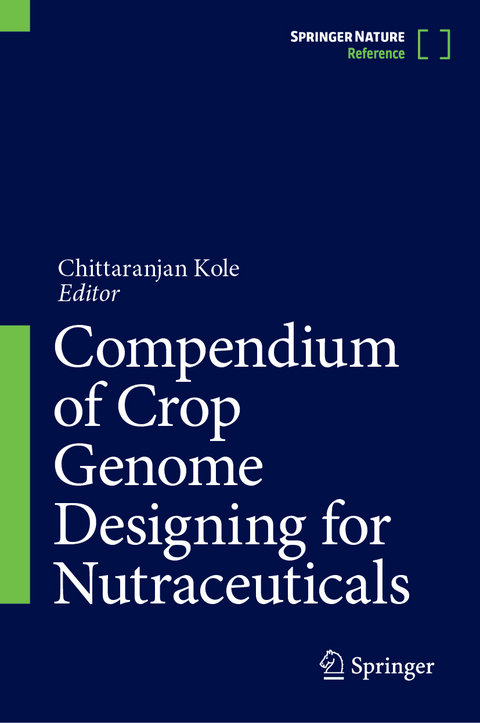
Compendium of Crop Genome Designing for Nutraceuticals
Springer Verlag, Singapore
978-981-19-4168-9 (ISBN)
Prof. Chittaranjan Kole is an internationally renowned academician with a spectacular professional career of about 40 years!. His pioneering scientific contributions, specifically in the fields of plant genomics and biotechnology, have been globally appreciated. Prof. Kole has developed a number of original concepts and strategies, which have contributed enormously to science and benefited the national as well as global society. His scholarly publications include 150-plus research articles and over 180 books with globally reputed publishers. Prof. Kole’s academic contributions have been profusely appreciated by seven Nobel Laureates including Profs. Norman E. Borlaug, Arthur Kornberg, Werner Arber, Phillip A. Sharp, Günter Blobel, Leland H. Hartwell, and Roger D. Kornberg. His scientific achievements have been honored with several awards, fellowships and recognitions including the “Outstanding Crop Scientist Award” conferred by the International Crop Science Society in recognition of his “life-time and original contributions in the field of crop science.” Prof. Kole worked as a researcher, faculty member and administrator in a large number of premier institutions and universities in India and abroad. In India, he worked across all academic positions from an Assistant Professor to Vice Chancellor in three premier universities including Orissa University of Agriculture and Technology, Sam Higginbottom University of Agriculture, Technology and Sciences, and Bidhan Chandra Krishi Viswavidyalaya. He also worked in Indo-Russian Center for Biotechnology as its First Project Coordinator. In abroad, he worked in the USSR Academy of Sciences, erstwhile USSR, as a PostDoctorate Scholar; University of Wisconsin, USA as an Overseas Research Associate; The Pennsylvania State University, USA, and Clemson University, USA, as a Visiting Professor; and Institute of Nutraceutical Research at Clemson University as Director of Research. Prof. Kole is recognized as a visionary science leader in the global arena. He is the Founding President of three international organizations including the Genome India International, International Climate Resilient Crop Genomics Consortium, and International Phytomedomics and Nutriomics Consortium. In recognition of his international leadership quality, the Food and Agriculture Organization invited Prof. Kole to act as the Leader of the Climate Change theme for the FAO International Symposium on “The Role of Agricultural Biotechnologies in Sustainable Food Systems and Nutrition” in 2016. He organized and chaired many prestigious international workshops, chaired several technical sessions; and delivered innumerable invited plenary lectures and keynote addresses in many international scientific meetings. Prof. M. S. Swaminathan, World Food Prize Laureate, once wrote to Prof. Kole that “You are a role model for all of us.” while Nobel Laureate in Chemistry Prof. Roger D. Kornberg wrote to the Honorable Prime Minister of India about Prof. Kole that “your country will be increasingly benefitted by utilizing his comprehensive knowledge and visionary ideas on science, education and agriculture.” Above all, Nobel Laureate in Peace, Dr. Norman E. Borlaug, the Father of Green Revolution, wrote to Prof. Kole that “May all Ph.D.s, future scientists and students that are devoted to agriculture get an inspiration as it refers to your work.”
Nutraceutical Usages and Nutrigenomics of Castor.- Genetic Enhancement of Nutraceuticals in Linseed: Breeding and Molecular Strategies.- Increasing Nutraceutical and Pharmaceutical Applications of Safflower: Genetic and Genomic Approaches.- Oil Palm: Genome Designing for Improved Nutritional Quality.- Nutritional Traits of Beans (Phaseolus vulgaris): Nutraceutical Characterization and Genomics.- Genetic Improvement of Nutraceutical Traits in Chickpea (Cicer arietinum L.).- Nutrient-Dense Pea (Pisum sativum L.): Genetics and Genomics Mediated Developments.- Breeding Cowpea: A Nutraceutical Option for Future Global Food and Nutritional Security.- Lentils (Lens culinaris Medik): Nutritional Profile and Biofortification Prospects.- Grain Micronutrients in Pigeonpea: Genetic Improvement Using Modern Breeding Approaches.- Rice Bean: A Neglected and Underutilized Food Crop Emerges as a Repertory of Micronutrients Essential for SustainableFood and Nutritional Security.- Improvement of Nutraceutical Traits of Banana: New Breeding Techniques.- Apples: Role of Nutraceutical Compounds.- Integrating Omic Tools to Design Nutraceutically Rich Citrus.- Watermelon: Advances in Genetics of Fruit Qualitative Traits.- Grapes: A Crop with High Nutraceuticals Genetic Diversity.-
| Erscheinungsdatum | 09.01.2024 |
|---|---|
| Zusatzinfo | 109 Illustrations, color; 48 Illustrations, black and white; XXXIII, 1635 p. 157 illus., 109 illus. in color. In 2 volumes, not available separately. |
| Verlagsort | Singapore |
| Sprache | englisch |
| Maße | 155 x 235 mm |
| Themenwelt | Naturwissenschaften ► Biologie ► Genetik / Molekularbiologie |
| Technik ► Umwelttechnik / Biotechnologie | |
| Weitere Fachgebiete ► Land- / Forstwirtschaft / Fischerei | |
| ISBN-10 | 981-19-4168-8 / 9811941688 |
| ISBN-13 | 978-981-19-4168-9 / 9789811941689 |
| Zustand | Neuware |
| Informationen gemäß Produktsicherheitsverordnung (GPSR) | |
| Haben Sie eine Frage zum Produkt? |
aus dem Bereich


